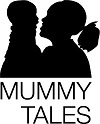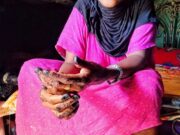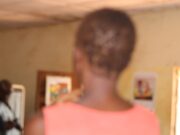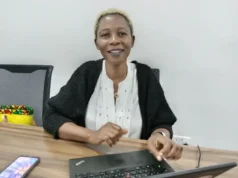By Maryanne W. Waweru l @MaryanneWaweru l wawerumw@gmail.com
Twenty-six-year-old Ashley* has always had a passion for modelling. When fresh in high school, her friends encouraged her to join their school’s Miss High School competition.
“They told me I had the body of a model. They said because I was tall and slim, I had the perfect body for any outfit, and that I had a beautiful face that complemented it. Encouraged, I enrolled in the competition and emerged position six, which was a notable achievement for a Form One girl who had never participated in any beauty contest before,” she remembers.
Ashely would continue taking part in the modelling competitions in high school, and when she joined campus, she began modelling for small businesses, showcasing their outfits for sale. She also did shoots with photographers who were building their professional portfolios. Ashely’s ventures not only exposed her to the modelling world, but also earned her an income.
The gorgeous photos
Everything went on well, until the day it didn’t.
“It was 2017, while in the last semester of my final year. I had a photoshoot for a client who was promoting his photography business. My outfit for the shoot was an off-white high-waisted rugged booty short, paired with a red crop-top and white sneakers. I had minimal make-up on with red lipstick. I took the photo in a squatting pose,” she recalls.
Later in the day, the photographer shared the photos and when she saw them, she was blown away.
“He had captured the images perfectly. They literally took my breath away. I was stunned by how gorgeous I looked. I had executed the assignment well.”
So captivated was she by the photos that she decided to upload them to her Facebook page.
Ashely’s Facebook page, with a following of over 12,000 fans was where she showcased her modelling photos, enabling her to get more gigs.
“I uploaded two of the photos on Facebook that night and retired to bed, happy with my achievements for the day. In the morning when I checked, I was encouraged by the comments. Fans were asking me who my photographer was, where they could get such sneakers, where the venue of the photoshoot was and other positive comments.”
Sex machine
That was until Ashley read one comment that wiped the smile off her face.
The comment, from an individual with a male profile read: ‘this is what we call a sex machine’.
“I was horrified!” she remembers.
The comment had attracted about 20 others beneath it, most by individuals with male profiles, and all of them just as bad.
The comments read:
“You look like a prostitute”.
“How much are you selling yourself?”
“You are shameful”.
There were more:
“When I started following you, you were a nice innocent girl, but I cannot believe you are now changing to this –someone who looks like they are soliciting. I followed this page because you were modelling good photos, but it looks like you have since turned to prostitution.”
“Just go sell yourself already!”
Ashely says that with every comment, her heart shattered into pieces. By the time she read the last comment, she was in a dejected trance.
Indecency before my father?
“I felt so humiliated. I had been brought up well and I was shocked that I was now associated with prostitution. Didn’t people understand fashion photography? I’d been comfortable sharing the photos online because my family, including my father, followed me on social media so I would never upload anything indecent. I felt that the comments were vicious and unwarranted. I had planned on uploading more photos that day, but I was now afraid. I switched off my phone and cried myself out.”
When she went to class that day, Ashley was unable to concentrate on her lectures.
“I began thinking that maybe that is how people viewed me in real life. Perhaps my friends and family saw me the same way my online followers had, only that they had never voiced it. Did they all view me as a woman of lose morals because of the clothes I wore for my modelling gigs, or the nature of photos that I took? Were those comments reflective of what everyone around me thought?” she wondered.
Because of this ‘shame’, Ashely disengaged from people –both offline and physically.
“I started looking down on myself as I felt judged. What if these online people identified me on the streets and called me a prostitute to my face? I started avoiding people as I feared everybody had seen the photos. I stopped going out in public. I just wanted to be indoors, alone.”
Selling her Facebook and Twitter pages
The incident affected other parts of Ashley’s life.
“I started wearing oversized, baggy clothes. I didn’t want to show my skin anymore, not even my hands or feet. I changed my wardrobe –the confidence I had about my body, my looks, and my outfits long gone.”
It got worse. Ashley decided to sell her Facebook and Twitter pages.
“I had no desire to be online anymore. The pages no longer served their purposes for me. Thoughts about the hurtful Facebook comments sunk me into a deep, dark hole. My Twitter account had over 40,000 followers while my Facebook page had over 12,000. I sold them since I had come to loathe social media platforms and what they had done to my persona,” she remembers.
But that was not all. The incident affected Ashely’s income.
“I had long stopped depending on my parents for my upkeep as the money I made helped me make ends meet as a campus student. I was also able to save. However, the incident made me stop taking modelling gigs, forcing me to return to my parents for their financial support, which is something I had never wanted to do,” she remembers.
Cyber-bullying
This experience, which took a heavy toll on Ashely’s health and wellbeing, is within the realm of cyber-bullying. According to UNICEF, cyber-bullying is bullying with the use of digital technologies and can happen on social media, messaging platforms, gaming platforms and mobile phones. Examples of cyber-bullying include spreading lies about or posting embarrassing photos or videos of someone on social media, as well as sending hurtful, abusive or threatening messages via social media. Online bullying ‘can feel as if you’re being attacked everywhere, even inside your own home and can seem like there is no escape.’ Cyber-bullying can affect the victim’s physical, mental, psychological, and social health. Emotionally, they may lose interest in the things they once loved.
Women are more vulnerable
While cyber-bullying, a form of online violence affects millions of people worldwide, girls and women are particularly vulnerable.
A global study by the Economist Intelligence Unit found the overall prevalence of online violence against women globally is 85%, with younger women being more likely to have personally experienced online violence. While alarming across the globe, the prevalence of online violence against women was 90% in Africa. The most common forms of online violence included misinformation and defamation (67%) cyber harassment (66%), hate speech (65%). Hacking and stalking (63%), video and image-based abuse (57%) and violent threats (52%). The study found that nearly three-quarters of women surveyed expressed concern about online abuse escalating to offline threats.
The need to end gender-based violence against women and girls is a matter of global concern. It has been elaborated in numerous international and regional instruments such as the Declaration on the Elimination of Violence against Women (DEVAW), the Convention on the Elimination of All Forms of Discrimination against Women (CEDAW) and the African Charter on Human and Peoples’ Rights and its Protocol on the Rights of Women in Africa (the Maputo Protocol). Locally, the Sexual Offences Act (2006) captures the issue of gender-based violence, though it does not explicitly tackle online gender-based violence.
Social media users in Kenya
In Kenya, there are about 17.86 million internet users in Kenya, according to 2023 data by research firm DataReportal. The report notes that there are 10.55 million social media users, equating to 19.3% of the total population. Further, 44.3% of Kenya’s social media users are female, while 55.7% are male. An already vulnerable population, the emergence and growth of the internet has increased women and girl’s vulnerability to its negative effects, including online gender-based violence.
Data from a survey conducted by Badili Africa in 2020 showed that 99% of young women in universities were not aware of their digital rights. The survey revealed that Facebook and Instagram were the leading platforms for the young women to likely experience a security breach in the form of pornographic content, explicit messages, trolling or cyber stalking. Some victims end up taking long breaks from these platforms or quitting altogether.
Legal frameworks
To address online violence, Kenya’s government has initiated various cybersecurity policy and legal initiatives and frameworks including: The Kenya Information and Communications Act (1998), the National Cybersecurity Strategy (2014), and the Computer Misuse and Cybercrimes Act (CMCA) (2018).
Through the 2014 Strategy, Kenya established the Kenya Computer Incident Response Team and coordination Centre (KE-CIRT/CC) and the National Digital Forensics Laboratory at the National Police Service under Directorate of Criminal Investigations (DCI).
Combating online violence
If one needs to report cases of cyber-crime, including online violence, the Directorate of Criminal Investigations (DCI) is one of the channels through which they can do so through its toll-free number 0800 722 203, as well as the DCI Twitter and Facebook pages. Individuals are also encouraged to report these incidents at police stations.
To complement government efforts, various civil society organisations have been working to combat online gender-based violence, including Badili Africa, which builds the capacity of young women in universities- as digital advocates to effectively navigate digital platforms to influence change as well as increase their inclusion in key decision-making processes.
Similarly, UNFPA is spearheading the BodyRight campaign, which aims to create awareness about digital violence and push lawmakers, digital companies, and social media platforms to take abusive use of human bodies seriously. The campaign seeks to empower women and young people to take ownership of their bodies online and make the digital world a safer space for everyone.
Eveminet is similarly addressing digital security by creating awareness among digital users on how to identify red flags, how to act and where to get help.
However, a lot more needs to be done to address online gender-based violence. Evelyne Kasina, Eveminet’s Chief Executive Officer (CEO) has a few recommendations.
“Though the Computer Misuse and Cybercrimes Act, 2018 is a good start, it needs to be strengthened to better address the specific challenges of online violence. This could include expanding the definition of online violence to include more types of abuse, increasing the penalties for perpetrators, and making it easier for victims to report abuse,” she says.
Ms. Kasina also advocates for the need for more research on online violence as this will help to broaden all stakeholder’s scope of the problem and subsequently develop effective interventions.
On supporting survivors of violence, Ms. Kasina notes that they need to be provided with more accessible and affordable support services, such as counselling, legal aid, and financial assistance.
“The government should provide funding for these services and ensure that they are accessible to all survivors.”
Where is Ashley today?
It is now six years since the incident that deeply affected Ashely. She graduated from campus and now works in Advocacy and Communications, consulting with different NGOs.
How has life changed for her, and what would she do differently now if a similar incident were to happen?
“Back then, I didn’t know that what had happened to me had a name. Now I know it is cyber-bullying, or online gender-based violence. Furthermore, since it had happened on Facebook, I now know that I can report it to Meta, who can act against the perpetrators,” she says.
Today, many online platforms have policy guidelines that regulate users’ conduct and allow for reporting of offences. Facebook states that ‘if you manage a Facebook Page, you may use the profanity filter to hide comments with profanity from your Page. Facebook determines what to hide by using the most reported words and phrases marked offensive by the community. Hidden comments with these words remain visible to the people who wrote them and their friends. They won’t be visible to everyone else.’
Similarly, TikTok has a dedicated team of moderators who are trained to identify and remove content that violates its policies against online gender-based violence. The platform also has several tools and features that users can use to protect themselves from abuse, such as the ability to block users and report content.
I wouldn’t have sold
There is something else that Ashley would have done differently regarding her social media accounts.
“I would not have sold my Facebook and Twitter accounts, just because someone made mean, untruthful comments about me. That is not who I was, and their comments should not have intimidated me. The abuser altered my life in way that I allowed him to, which shouldn’t have happened.”
However, Ashely does not believe the pain would be any less now, than it was then.
“I’d still be deeply hurt if anyone said such words to me. Back then I was only 20 years old and naïve, but even now when I’m more mature and more exposed, I can’t say I’m at the point where I have a tough skin to deal with online attacks. I still feel fragile.”
Return to social media and being blacklisted
Ashley’s work sometimes requires her to access different online platforms.
I’m very cautious on social media. I have ‘ghost’ Facebook and Twitter accounts, which I only use when I need to access my client’s pages. I am however on LinkedIn with my full profile because I feel it is a professional platform where users are unlikely to be abusive,” she says.
Ashely has since resumed modelling, but she’s very particular about the jobs she takes.
“I am now in control of the photos of me that are published. I don’t take photos in clothes that I’m not comfortable in. I do not wear short or revealing clothes. I’m also very keen on the photographers I work with because a photographer’s shot can portray you in a way that you wouldn’t want depicted. As a matter of principle, I refuse to pose in certain ways they ask of me if I feel uncomfortable.”
Because of this, Ashley has lost some jobs, as she has been labelled a ‘kichwa ngumu’ (difficult model to work with).
“They prefer working with girls who agree to everything they ask. I have even been blacklisted by some modelling agencies, and I’m okay with that,” she states firmly.
*I used this pseudonym to protect Ashley’s identity. She is still healing and emotionally recovering from the incident.
Do you have feedback on this article? Comment down below or email me at wawerumw@gmail.com
 Mummy Tales is a platform dedicated to empowering its readers on different aspects of womanhood and motherhood. Read more motherhood experiences of Kenyan moms here. Connect with Mummy Tales on: FACEBOOK l YOU TUBE l INSTAGRAM l TWITTER
Mummy Tales is a platform dedicated to empowering its readers on different aspects of womanhood and motherhood. Read more motherhood experiences of Kenyan moms here. Connect with Mummy Tales on: FACEBOOK l YOU TUBE l INSTAGRAM l TWITTER
Featured image courtesy: Iwaria





































